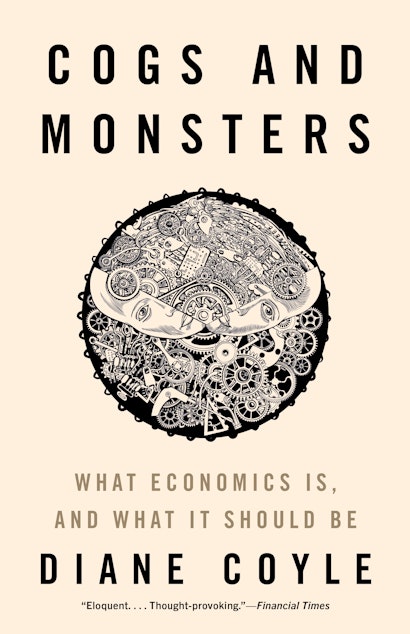Digital technology, big data, big tech, machine learning, and AI are revolutionizing both the tools of economics and the phenomena it seeks to measure, understand, and shape. In Cogs and Monsters, Diane Coyle explores the enormous problems—but also opportunities—facing economics today and examines what it must do to help policymakers solve the world’s crises, from pandemic recovery and inequality to slow growth and the climate emergency.
Mainstream economics, Coyle says, still assumes people are “cogs”—self-interested, calculating, independent agents interacting in defined contexts. But the digital economy is much more characterized by “monsters”—untethered, snowballing, and socially influenced unknowns. What is worse, by treating people as cogs, economics is creating its own monsters, leaving itself without the tools to understand the new problems it faces. In response, Coyle asks whether economic individualism is still valid in the digital economy, whether we need to measure growth and progress in new ways, and whether economics can ever be objective, since it influences what it analyzes. Just as important, the discipline needs to correct its striking lack of diversity and inclusion if it is to be able to offer new solutions to new problems.
Filled with original insights, Cogs and Monsters offers a road map for how economics can adapt to the rewiring of society, including by digital technologies, and realize its potential to play a hugely positive role in the twenty-first century.
Diane Coyle (@DianeCoyle1859) is the Bennett Professor of Public Policy at the University of Cambridge. Diane co-directs the Bennett Institute where she heads research under the themes of progress and productivity. Her latest book is Cogs and Monsters: What Economics Is, and What It Should Be on how economics needs to change to keep pace with the twenty-first century and the digital economy.
Stephanie Hare (@hare_brain) is a researcher, broadcaster and author focused on technology, politics and history. Selected for the BBC Expert Women programme and the Foreign Policy Interrupted fellowship, she contributes frequently to radio and television and has published in the Financial Times, The Washington Post, the Guardian/Observer, the Harvard Business Review, and WIRED.
Erica Thompson (@H4wkm0th) is a Senior Policy Fellow in Ethics of Modelling and Simulation at the LSE Data Science Institute, funded by a UKRI Future Leaders Fellowship. Erica is also a Fellow of the London Mathematical Laboratory, where she leads the research programme on Inference from Models and is an Honorary Senior Research Fellow at UCL’s Department of Science, Technology, Engineering and Public Policy.
Minouche Shafik is President and Vice Chancellor of the London School of Economics and Political Science. She was previously a senior leader of the Bank of England, the International Monetary Fund, and the World Bank. She is an alumna of LSE. Her new book, What We Owe Each Other: A New Social Contract, is out now.
